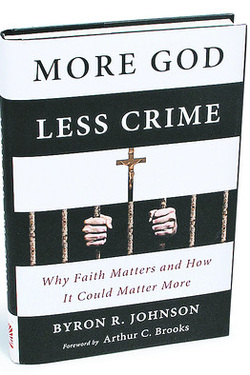
Does this prove that religion reduces crime? Not precisely, for these are all quasi-experimental studies. If they were truly experimental and thus carried greater intellectual weight, the researchers would direct people, none of whom had any religion, either to acquire and practice one or to remain godless and thereby stay in the control group. We would then compare the groups' crime rates. Doing this would be immoral, illegal and impractical, and so we are left with studies that compare religious and nonreligious people and try to control statistically for other factors that might explain away the religion-and-crime link.
How much confidence, then, should we have in nonexperimental studies? Not a lot, as none of the studies that Mr. Johnson cites show the statistical controls necessary to evaluate them. But offsetting this weakness is the number of studies showing a religious effect. And we can look at a few of the best ones, such as that by Richard Freeman. A Harvard professor of economics, he arranged for 2,358 young black men living in downtown Boston, Chicago and Philadelphia to be interviewed. He found that, other things (such as family and economic background) being equal, going to church is associated with substantial differences in how young men behave. More churchgoing, less crime, less alcohol and fewer drugs. As Mr. Freeman puts it: "The effect of churchgoing is not the result of churchgoing youth having 'good attitudes.' " If you want to see his reasons, look at his book "The Black Youth Employment Crisis" (1986).
The interesting question is whether society can make religion more important in the lives of convicted offenders. The largest effort to do this is managed by the Prison Fellowship, an organization created by Charles Colson in the 1970s when he was in jail after having pleaded guilty to charges involving his role in the Nixon administration's effort to discredit Daniel Ellsberg, the Pentagon Papers leaker.
Evaluating the Prison Fellowship program is not easy. Inmates, according to the organization, must complete all three phases of its program in order to benefit. Phase one involves Bible study while in prison; phase two requires community service during the day at a nearby city; and phase three means linking up with mentors and churches in the community. Each phase lasts about a year.
Mr. Johnson looked at the program's effectiveness in Texas and found that those who completed all three phases were much less likely to be arrested or incarcerated for a new crime than those who dropped out. The key question is whether the inmates who go through all three phases differ in other ways from those who never join the program or drop out early.
In an earlier study of inmates at four New York prisons, Mr. Johnson says, there was no difference between Fellowship and non-Fellowship groups over an eight-year period except for those members of the program who worked hard at Bible studies. Even then, the effect lasted for only two or three years after their release.
But these findings do not fully address a problem that social scientists call "selection bias." If people who join a long program and stay with it are different in motivation from those who drop out, we cannot be sure that Bible study makes a difference. The selection-bias problem, I suspect, afflicts many of the studies that Mr. Johnson summarizes. The strongest results come from studies (there are a few) that compare people in the Prison Fellowship with those who volunteered for it but weren't selected.
But wait, the story doesn't end there....The second story that Mr. Johnson has to tell in "More God, Less Crime" is about what happens to academics—in his case, a criminologist—who turn their attention to religion. When he was a young scholar at Memphis State University (now the University of Memphis) in the mid-1980s, Mr. Johnson was told by his department chairman that none of his articles involving religion would count toward getting tenure. Though Mr. Johnson began publishing articles in academic journals about subjects other than religion, two years later he was fired. In his appeal to the dean, Mr. Johnson mentioned his publications and high student evaluations. The dean replied: "I don't need to have a reason," adding: "I can let you go if I don't like the color of your eyes."With three small children at home, Mr. Johnson was desperate to save his job. He appealed to the provost, who told him: "You simply don't fit in here. I think you need to consider getting a job teaching at some small Christian college." The provost added, according to Mr. Johnson, that he would have "the same problem" at any other state university. Mr. Johnson then said to the provost: "If I were a Marxist we wouldn't even be having this conversation, would we?" The provost "nodded in agreement."
Mr. Johnson moved on to the University of Pennsylvania, where in the 1990s he continued to publish material on religion (even though the school is funded in large part by the state). In 2004, he took a job at Baylor University, a private Baptist institution, where he has been quite successful. His advice to young scholars: Get tenure before you start writing about religion.
This post came from the Wall Street Journal. It was written by James Q Wilson. The original article can be found here:
http://online.wsj.com/article/SB10001424052748703778104576287043835803026.html?mod=WSJ_newsreel_opinion
BE HOLY.
BE A MAN.
 RSS Feed
RSS Feed